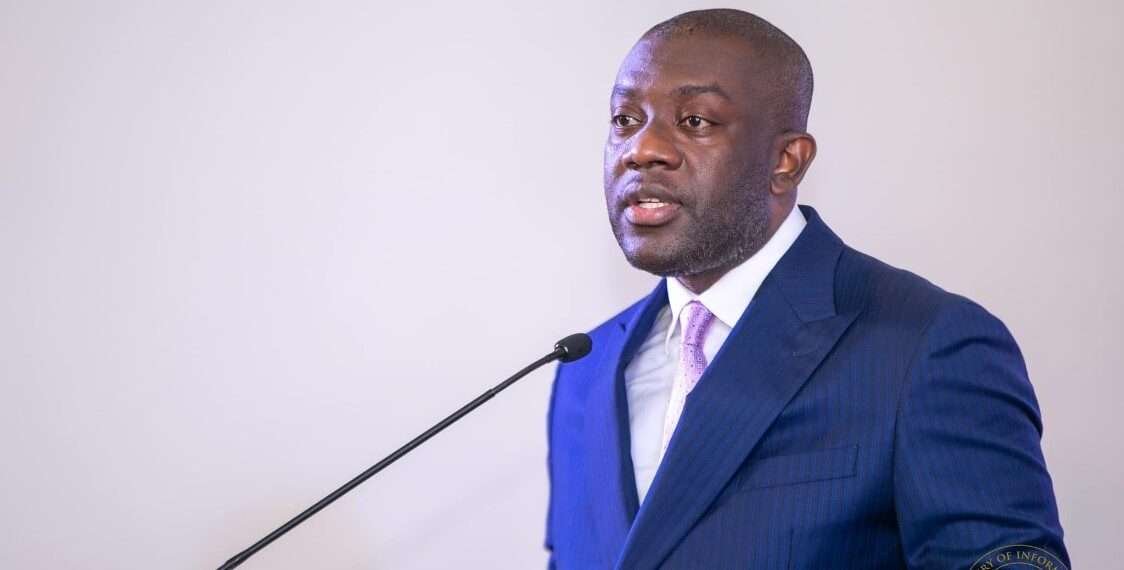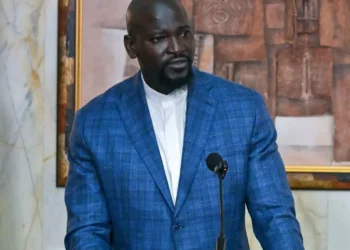The Minister of Works and Housing Hon. Kojo Oppong Nkrumah, at a press conference, gave an update on the housing sector in the country.
He highlighted the importance of investing in housing at both the national and macroeconomic levels, stating that attention to housing development creates numerous benefits for the economy.
These include job creation, growth in the construction sector, and wealth creation for individuals and businesses.
However, he also outlined several challenges that continue to plague the sector, from financing issues to affordability and infrastructure deficits.
Despite these hurdles, Hon. Kojo Nkrumah noted that significant progress has been made in reducing Ghana’s housing deficit in the last decade.
One of the key points Hon. Kojo Nkrumah emphasized was the role housing projects play in job creation.
He noted that whenever a housing project is underway, it creates employment opportunities for numerous individuals, Citing specific examples.
“Quite recently, one of the housing projects that we did, the Tesano Security Services Housing Project, we were informed that close to about 500 people were working on that project for about three years that project was under construction.’’
Hon. Kojo Oppong Nkrumah Ghana’s Minister of Works and Housing
This example underscored the positive economic impact of housing projects, especially in creating jobs for skilled and unskilled workers alike.
He further explained that the continuation of housing projects, such as the second phase of the police project, has led to the re-engagement of many workers, further highlighting the economic benefits of housing initiatives.
The Impact of Housing on the Construction Sector and Broader Economy
Hon. Kojo Nkrumah explained that investing in housing also stimulates growth in the construction sector, which has ripple effects on the broader economy.
He pointed out that when the Ghana Statistical Service reports growth in the economy, the construction sector is often a significant contributor.
“When you’re investing heavily in housing, not only are you creating jobs, you are also stimulating growth in the construction subsector and by extension, growth in the broader Ghanaian economy.”
Hon. Kojo Oppong Nkrumah Ghana’s Minister of Works and Housing
This statement highlighted the critical link between housing investments and overall economic development, emphasizing the potential of the housing sector to be a key driver of economic growth in Ghana.
Wealth Creation Through Housing
Beyond job creation and economic growth, Hon. Kojo Nkrumah discussed how housing has contributed to wealth creation for various stakeholders.
Individuals who purchase houses gain valuable assets that can be leveraged for future investments.
“The individual who has bought that house now gets an asset class, he may have financed it with a mortgage or a loan, but very quickly he will have property worth 100,000 or 200,000 or 400,000 that helps him on the wealth creation ladder.”
Hon. Kojo Oppong Nkrumah Ghana’s Minister of Works and Housing
He further explained that wealth is also generated for real estate companies, construction firms, and banks that finance housing projects. Housing developments, therefore, have contributed to building wealth across multiple sectors of the economy, not just for homeowners.
Despite the benefits, Hon. Kojo Nkrumah outlined several key challenges that continue to affect housing delivery in Ghana.
He acknowledged that while the country has a housing policy, the implementation of effective programs to deliver housing has been lacking. One of the main issues is the reliance on the private sector for most housing delivery, with little government intervention or support. He noted; “About 99% of the housing you find today is delivered by the private sector on their own.”
This has resulted in high housing prices, making it difficult for many Ghanaians to afford decent homes. Hon. Kojo Nkrumah also pointed to the challenge of construction finance, noting that large-scale housing projects require significant capital, which is often difficult to secure in Ghana’s financial market.
“Getting the financing to deliver these projects on time is a big problem. How many real estate companies even, can do these large-scale projects or can borrow, and how many banks can on their own here in Ghana finance some of these projects? without having to syndicate or rely on other institutions.”
Hon. Kojo Oppong Nkrumah Ghana’s Minister of Works and Housing
Affordability remained another major issue, as the cost of materials like cement and iron rods makes it challenging to provide affordable housing.
Additionally, infrastructure such as roads, sewage systems, and energy are often not adequately planned for, causing delays and difficulties in completing housing projects.

Progress and Priorities Moving Forward
Despite the challenges, Hon. Kojo Nkrumah highlighted that Ghana has made some progress in reducing its housing deficit over the past decade. From a deficit of about 2.8 million units in 2010, the country now has a deficit of approximately 1.8 million units.
This 33% reduction has been achieved mainly through private sector efforts, although the prices remain high, pushing many out of the market. Hon. Kojo Nkrumah emphasized the need to bring the housing market into equilibrium over the next decade, outlining eight priorities that the Ministry of Works and Housing will focus on.
The priority is to resolve stalled housing projects. Hon. Kojo Nkrumah mentioned several housing projects that had stalled for various reasons. He reiterated; “Priority number one is to resolve those.”
He also emphasized the need to fast-track ongoing affordable housing programs and expand public sector housing.
Given that the government of Ghana is the largest employer in the country, Hon. Kojo Nkrumah noted the importance of providing housing for public servants to improve their living conditions and service to the republic.
Moving Towards Housing Market Equilibrium
Hon. Kojo Oppong Nkrumah’s press conference offered valuable insights into the state of Ghana’s housing sector.
While challenges such as construction finance, affordability, and infrastructure deficits remain, the government has identified key priorities to address these issues and bring the housing market into equilibrium over the next decade.
The focus on resolving stalled projects, expanding public sector housing, and securing land banks shows a commitment to addressing the housing deficit and providing more affordable housing options for Ghanaians.
READ ALSO; Omah Lay Hails Davido Ahead of Their Collaboration



















